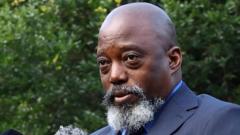The Democratic Republic of Congo's Senate has revoked the legal immunity of former President Joseph Kabila, paving the way for his prosecution on treason charges. Kabila, facing accusations of providing support to the M23 militia, an armed group active in the eastern part of the country, has been linked to significant allegations of war crimes.
In a decisive vote, nearly 90 senators supported the lifting of Kabila's immunity, with only five opposing the move. Senate Speaker Jean-Michel Sama Lukonde announced the decision, emphasizing the need to pursue the charges against the ex-leader. Kabila, who served as president from 2001 until 2019, did not appear to defend himself in the senate.
Having been granted the title of "senator for life" after leaving office, Kabila previously enjoyed legal protection. However, in light of the treason charges, the military prosecutor requested the Senate to lift this privilege. For the past two years, Kabila has resided in South Africa but hinted at a return to the DR Congo to contribute to resolving the ongoing conflict in the east.
Reports regarding Kabila's potential return surfaced a few weeks ago, specifically naming Goma, a city under M23 control. These claims were denied by his political party, the People's Party for Reconstruction and Democracy (PPRD). The party has recently faced sanctions from the Congolese government due to its alleged failure to address the M23’s activities.
Justice Minister Mutamba has echoed calls for Kabila to return and respond to the legal actions against him, which include the seizure of his assets. Analysts warn that Kabila's trial could exacerbate the instability in a nation that has grappled with the M23 rebellion since its inception in 2012.
Kabila’s party has dismissed the prosecution as “pure theatre,” asserting it serves to divert the public's attention from more pressing national issues. Kabila, who rose to power at just 29 following his father’s assassination, previously allied with current President Félix Tshisekedi, but their relationship deteriorated following the collapse of their political coalition in late 2020.
Kabila left Congo for South Africa in 2023 under the guise of pursuing education. Meanwhile, clashes between the M23 and Congolese military forces have continued, causing extensive civilian displacement. Recent discussions hint at a peace deal between the DR Congo and Rwanda, which has denied any association with the M23. Last month, both nations reached a preliminary accord in Washington, establishing a framework for potential peace.
The DR Congo government had earlier pursued the prosecution of M23 leaders, with military courts issuing death sentences for three of its senior figures in absentia, as efforts to restore order in the region continue.
In a decisive vote, nearly 90 senators supported the lifting of Kabila's immunity, with only five opposing the move. Senate Speaker Jean-Michel Sama Lukonde announced the decision, emphasizing the need to pursue the charges against the ex-leader. Kabila, who served as president from 2001 until 2019, did not appear to defend himself in the senate.
Having been granted the title of "senator for life" after leaving office, Kabila previously enjoyed legal protection. However, in light of the treason charges, the military prosecutor requested the Senate to lift this privilege. For the past two years, Kabila has resided in South Africa but hinted at a return to the DR Congo to contribute to resolving the ongoing conflict in the east.
Reports regarding Kabila's potential return surfaced a few weeks ago, specifically naming Goma, a city under M23 control. These claims were denied by his political party, the People's Party for Reconstruction and Democracy (PPRD). The party has recently faced sanctions from the Congolese government due to its alleged failure to address the M23’s activities.
Justice Minister Mutamba has echoed calls for Kabila to return and respond to the legal actions against him, which include the seizure of his assets. Analysts warn that Kabila's trial could exacerbate the instability in a nation that has grappled with the M23 rebellion since its inception in 2012.
Kabila’s party has dismissed the prosecution as “pure theatre,” asserting it serves to divert the public's attention from more pressing national issues. Kabila, who rose to power at just 29 following his father’s assassination, previously allied with current President Félix Tshisekedi, but their relationship deteriorated following the collapse of their political coalition in late 2020.
Kabila left Congo for South Africa in 2023 under the guise of pursuing education. Meanwhile, clashes between the M23 and Congolese military forces have continued, causing extensive civilian displacement. Recent discussions hint at a peace deal between the DR Congo and Rwanda, which has denied any association with the M23. Last month, both nations reached a preliminary accord in Washington, establishing a framework for potential peace.
The DR Congo government had earlier pursued the prosecution of M23 leaders, with military courts issuing death sentences for three of its senior figures in absentia, as efforts to restore order in the region continue.





















